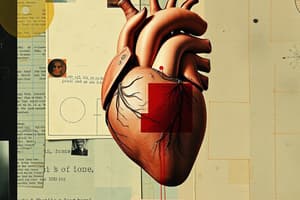Podcast
Questions and Answers
What effect does sympathetic activation have on heart rate?
What effect does sympathetic activation have on heart rate?
- Irregular heart rate
- Decreases heart rate
- No change in heart rate
- Increases heart rate (correct)
Which of the following best describes the effect of sympathetic activation on cardiac contractility?
Which of the following best describes the effect of sympathetic activation on cardiac contractility?
- It decreases contractility
- It causes muscle fatigue
- It has no effect on contractility
- It increases contractility (correct)
What physiological change occurs as a result of venoconstriction during sympathetic activation?
What physiological change occurs as a result of venoconstriction during sympathetic activation?
- Decreased blood return to the heart
- Increased blood return to the heart (correct)
- Decreased blood pressure
- Decreased heart oxygen demand
Which statement about sympathetic activation is incorrect?
Which statement about sympathetic activation is incorrect?
How does sympathetic activation affect venous blood flow?
How does sympathetic activation affect venous blood flow?
What is the primary goal of using diuretics in patients experiencing volume overload?
What is the primary goal of using diuretics in patients experiencing volume overload?
Which of the following diuretics is commonly used first-line for volume overload management?
Which of the following diuretics is commonly used first-line for volume overload management?
Which diuretic can be considered as an alternative when furosemide is not effective?
Which diuretic can be considered as an alternative when furosemide is not effective?
Which of the following thiazide-like diuretics can be used for the management of volume overload?
Which of the following thiazide-like diuretics can be used for the management of volume overload?
What types of symptoms might indicate the need for diuretic treatment?
What types of symptoms might indicate the need for diuretic treatment?
What causes backward symptoms and signs in heart failure?
What causes backward symptoms and signs in heart failure?
Which type of congestion is associated with left side heart failure?
Which type of congestion is associated with left side heart failure?
In right side heart failure, which condition is primarily indicated?
In right side heart failure, which condition is primarily indicated?
What is the result of pulmonary venous congestion?
What is the result of pulmonary venous congestion?
Backward symptoms and signs are primarily a result of which physiological issue?
Backward symptoms and signs are primarily a result of which physiological issue?
What condition is associated with arrhythmia as a common symptom?
What condition is associated with arrhythmia as a common symptom?
Which of the following is NOT a part of the T-F-A-I-L-E mnemonic?
Which of the following is NOT a part of the T-F-A-I-L-E mnemonic?
What is the significance of 'I' in the T-F-A-I-L-E mnemonic?
What is the significance of 'I' in the T-F-A-I-L-E mnemonic?
Which endocrine issue is mentioned in the T-F-A-I-L-E mnemonic?
Which endocrine issue is mentioned in the T-F-A-I-L-E mnemonic?
What can failure to take medication lead to as indicated in the T-F-A-I-L-E mnemonic?
What can failure to take medication lead to as indicated in the T-F-A-I-L-E mnemonic?
What is the effect of daytime activities on kidney blood flow in heart failure patients?
What is the effect of daytime activities on kidney blood flow in heart failure patients?
What is nocturia, and why does it occur in heart failure patients during bed rest?
What is nocturia, and why does it occur in heart failure patients during bed rest?
What is oliguria, and how is it defined in the context of kidney function?
What is oliguria, and how is it defined in the context of kidney function?
Why does bed rest serve as a diuretic for patients with heart failure?
Why does bed rest serve as a diuretic for patients with heart failure?
What physiological change occurs in patients with heart failure leading to daytime oliguria?
What physiological change occurs in patients with heart failure leading to daytime oliguria?
Flashcards are hidden until you start studying
Study Notes
Heart Failure Management
- Loop diuretics are commonly used to relieve symptoms of volume overload such as dyspnea and peripheral edema.
- Furosemide (Lasix) is the most commonly used loop diuretic.
- Other options include bumetanide (Bumex) and torsemide.
- Thiazide-like diuretics such as metolazone and chlorothiazide can also be used.
- The acronym "T-F-A-I-L-E" helps remember potential causes of worsening heart failure:
- Thyrotoxicosis
- Failure to take medication
- Arrhythmia (common)
- Infection (especially chest infections), Ischemia (common)
- Lung problems
- Endocrine (phaeochromocytoma, DM)
- Sympathetic activation in heart failure leads to:
- Increased heart rate (chronotropy)
- Increased contractility (inotropy)
- Increased preload due to venoconstriction, which drives more blood back to the heart.
- Backward symptoms and signs occur as a result of blood congestion in the venous system.
- Pulmonary venous congestion (P.V.C) occurs in left-sided heart failure.
- Systemic venous congestion (S.V.C) occurs in right-sided heart failure.
- Kidney function is affected in heart failure:
- Daytime oliguria (reduced urine output) and nocturia (increased urination at night) are common.
- Limited cardiac output during daily activity shifts blood flow from kidneys to skeletal muscles, leading to decreased renal blood flow (oliguria < 30ml/hr).
- At rest, blood flow shifts from relaxed skeletal muscles back to the kidneys, leading to an increase in nocturnal urine production.
Studying That Suits You
Use AI to generate personalized quizzes and flashcards to suit your learning preferences.




